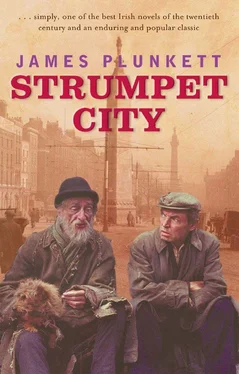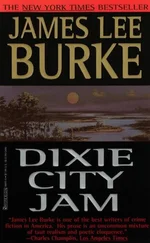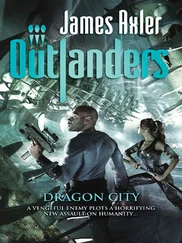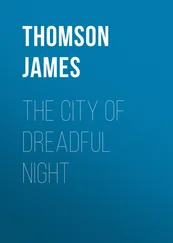‘Because this is a theatrical bin,’ Rashers explained. For a moment Father O’Connor was lost. Then he realised that the windowless side wall behind him belonged to the Royal Theatre and, presumably, the bin was an extra-mural property.
‘I understand,’ he said, looking skywards, so as to hide his smile.
The grey sky, unsmiling, looked back at him. It was only the merest strip above the narrow street, yet it was big enough to contain all the despair of the winter city. Father O’Connor lowered his eyes quickly. The sky, the long, wet, unrelieved wall, the cramped street, the forsaken cobbles, they combined about this ragged figure and turned him suddenly into a denial of God. Should a man smell of filth and scrape in bins?
He said, ‘And what has a theatrical bin to offer?’
‘Cigars and cigarette butts, half smoked at the intervals,’ Rashers said. ‘They light them up and the bell goes and they throw them half finished away. There’s good smoking in a theatrical bin.’ He dug into his pockets.
‘There’s a sample collection,’ he said, displaying his goods.
Father O’Connor pretended interest. He felt the muscles about his mouth tightening and turned his head quickly. Perhaps Father Giffley was right. Perhaps he should not look too closely at things until he had learned the trick of controlling his face.
‘You did well,’ he said.
‘I did better, Father,’ Rashers added. He fumbled and displayed another find.
‘What’s that?’ Father O’Connor asked.
‘It’s a broken ’cello string,’ Rashers said, ‘which is a class of musical instrument.’
Yearling came to mind, smelling of whiskey and with red cheeks. Father O’Connor thought of conversation and smiling, well-mannered people. He tried to dismiss them. It was a world he had turned his back on.
‘Is it useful?’ he asked.
Rashers extended the string to its full length.
‘That’s the best cure for rheumatism in the land,’ he said. ‘I know many a carter will give me twopence for it. Have a look at it.’
But Father O’Connor moved a pace away, declining. The string had come from a dustbin and the hands which offered it for scrutiny were filthy. Rashers, noting the refusal, continued:
‘The carter humps thirty-five tons of coal a week, up and down stairs, in every weather. After a while he gets a dose of rheumatism from the wet sacks. And the only good cure for it is to tie a ’cello string around your waist, right against the skin.’
An older man might have smiled. Father O’Connor did not.
‘They should have more sense,’ he said reprovingly.
‘It’s some virtue in the gut,’ Rashers explained. ‘It’s not there when it’s new, but when the sweat of the fingers has soaked into it, it has the power to draw out the poison. That’s why only used strings is any use.’
‘Nonsense,’ Father O’Connor said. Rashers said nothing. But he took care putting the string back in his pocket The wind caught the two of them, fluttering Rashers’ coat and causing O’Connor to grasp at his hat.
‘We’ll both have rheumatism if we stand here,’ Father O’Connor said. Rashers, realising he was being dismissed, touched his forehead and shuffled away.
Father O’Connor went in the direction of the main thoroughfare, distressed by the poverty which reached out to him from every side, and wondering again what he could do to relieve those who suffered it. The obvious thing was to form a charitable society. Father Giffley had never done so—why, it was hard to understand. Furthermore, Father Giffley would be hard to approach. It would be necessary to beg permission.
That consideration, he determined, must not stop him. He must not let human pride undermine him; he must suffer rebuffs in a spirit of complete humility. But he would need advice and counsel. It occurred to Father O’Connor that the Bradshaws could help him. He considered the problem carefully, weighing his resolve to keep away from comfort and gracious company against his need for guidance and help, a little fearful as he wrestled with it that he might be merely seeking a justification for a visit that was bound to be refreshing and enjoyable. Father O’Connor walked and thought for some time until at last, almost without knowing how it happened, he found himself sitting in the Kingstown tram.
‘About our ninepence an hour,’ Mulhall said, as they were having their second drink.
‘Carrington says you can do nothing,’ Fitz said.
‘Neither can we,’ Farrell said. ‘We don’t work for the foundry. They have us by the short hairs.’
‘I have an idea,’ Mulhall said quietly. ‘They tried it in Belfast.’
‘I wouldn’t be gone on anything they try in Belfast,’ Hennessy said.
The hot whiskey had brought a glow to his cheeks. His eyes were brighter. They searched the public house as he spoke, a pair of magpie eyes that gathered all the scraps and gossip of living.
‘I heard tell of a raffle someone ran once,’ Hennessy explained. ‘The first prize was a week’s holiday in Belfast. And do you know what the second prize was?’
He paused long enough to fix their attention. Then he said:
‘The second prize was two weeks’ holiday in Belfast.’ They laughed, all except Farrell, who said to Mulhall:
‘How do you propose to get the ninepence out of them.’
‘This way. The foundry crowd take coal from Doggett & Co. Very well. The next time I’m told to deliver to the foundry, I’ll refuse.’
‘What good will that do?’ Hennessy asked. ‘They’ll only sack you.’
‘Not if everyone else in Doggett & Co. stands by me.’
‘They could get it from us,’ Pat said.
‘Not if the Nolan & Keyes men do the same thing,’ Mulhall said.
They thought over this. It sounded impracticable at first, but gradually its possibilities suggested themselves.
‘You stand by us—we stand by you?’ Pat said. He was beginning to consider the idea.
‘Simple,’ Mulhall said.
‘Suppose they sack someone,’ Pat offered. ‘Suppose a carter is told to deliver and he refuses and he’s sacked. What then?’
‘Everybody downs tools,’ Mulhall said.
‘We get some of the coal direct from our own boats in the foundry,’ Fitz pointed out.
‘When they start doing that we’ll call on your fellows not to unload,’ Mulhall said.
‘You’d have the whole bloody city tied up in a week, at that rate,’ Pat put in worried.
‘Why not?’ Mulhall urged. ‘That’s what they did in Belfast.’
‘For three shillings?’ Hennessy asked, sceptical.
Farrell banged the table suddenly and roared at him.
‘For principle.’
His face had become thunderous. Hennessy shrank back.
‘No offence,’ he said, in a startled voice.
‘That’s what’s wrong with this city,’ Farrell said. ‘There isn’t a man of principle in it. I was steady on the quays until I refused to buy the stevedore a drink when he brought us into his brother’s pub to pay us. And I haven’t got a job on the quays since.’
Fitz put his hand on Farrell’s shoulder.
‘What Hennessy says makes sense,’ he said. ‘The issue is only three shillings for about twelve hands. No union would tie up a whole dockside for that.’
‘Larkin would. We have an agreement,’ Mulhall insisted.
‘With the carting firms, but not with the foundry.’
‘Larkin fixed the carters’ rate. It applies to everybody.’
‘Larkin might risk tying up the docks the way you suggest,’ Fitz said, ‘but Sexton and the British Executive won’t. It’s too costly.’
‘If Larkin agrees to do it,’ Mulhall said, ‘I don’t care a damn what the Executive says or thinks. And I’m going to see him about it tomorrow when we knock off.’
Читать дальше












